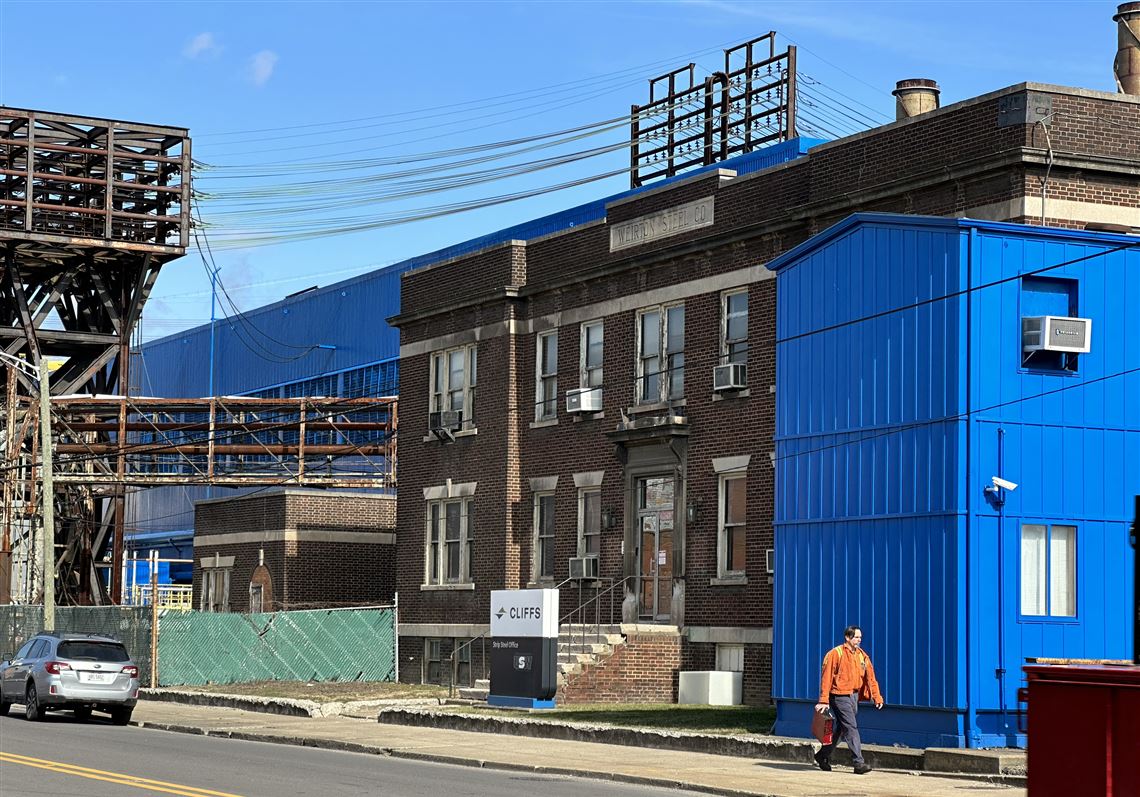WEIRTON, W.Va. — The day after more than 900 workers learned they would soon be losing their jobs making tinplate at a mill that helped build America, dozens lined up for a pair of new boots.
“They still have to work somewhere, and they ought to be safe doing it,” said a representative of Safety Shoe Distributors, who pulled up just outside the Weirton mill on Friday, as the company has for the past decade, determined to keep manufacturers safe on the job even as the security of those jobs slips away.
Cleveland-Cliffs, which has owned Weirton’s tinplate facility since 2020, offered its own assurances in the form of relocation payments. Others have already interviewed for positions down the street at Massachusetts-based Form Energy’s new battery plant, likely to open this summer.
“There’s a certain resilience to this place,” said city Manager Mike Adams, who has lived his whole life here on the banks of the Ohio River.
But even for a town accustomed to the economic swings of industrial manufacturing, most of the town’s fewer than 19,000 residents were unprepared for the shock of a full plant shutdown, which could now come as early as April. They blame the closure on the federal government, which voted earlier this month to not tax tin imports from Canada, China, Germany and South Korea.
“To me it’s an act of treason,” said Mark Glyptis, the local president of the United Steelworkers union, looking at once hurt and resolute as he gestured with weathered hands. “It’s absolutely the wrong decision for America and its people.”
Mr. Glyptis traveled with the region’s congressional delegation to Washington D.C. last month to lobby for the tariffs, which he said would protect the country’s last remaining mills making tinplate, steel sheets coated with a thin layer of tin. Only three domestic manufacturers — Cleveland-Cliffs, U.S. Steel and Ohio Coatings — still make the metal used in food cans and other consumer goods.
The Commerce Department originally approved tariffs in August based on evidence of unfair trading, but the U.S. International Trade Commission overruled that decision, arguing that imported goods weren’t hurting domestic production.
Within days, Cleveland-Cliffs customers that had been loyal for years pulled out, Mr. Glyptis said. The list included Silgan Containers, which makes the cans for Campbell’s Soup.
“You can’t operate without orders,” Mr. Glyptis said.
In a statement, Cliffs CEO Lourenco Goncalves said the ITC decision made it “impossible for us to viably produce tinplate.”
The ITC declined to comment when asked about the potential plant closure and any role the agency’s Feb. 6 ruling may have had. A full report on the commissioners’ decision will be made public on March 13.
Officials plan to appeal ruling
In the meantime, Mr. Glyptis said he intends to travel back to D.C. to garner support for an appeal process.
“I’ll fight as long as I’ve got a breath in my body to get this decision overturned,” the 73-year-old said. “It’s not over.”
As union chief for the past 32 years, Mr. Glyptis has led Weirton through multiple ownership changes and a dozen trade cases without a single loss.
He’s not going to let that record slip without a fight.
For Mary Zwierzchowski, a local author and librarian whose husband worked in the mill, the ITC decision felt like it was made by faraway people who don’t understand the situation on the ground.
“Who are they?” she asked. “Where do they live? And how can they say there was no [impact] when we feel we were ruined?”
For decades, Ms. Zwierzchowski has helped make the public library a bright oasis on an otherwise struggling Main Street. A slight but dignified woman, she is usually the one answering questions, not raising them. But now it’s hard to know what’s next.
According to its website, the ITC operates as “an independent, nonpartisan, quasi-judicial federal agency.” Two of its four members were nominated by President Barack Obama, the other half by President Donald Trump.
U.S. Sens. Joe Manchin of West Virginia and Sherrod Brown of Ohio testified to the ITC in support of the tariffs, which they said would help ensure a level playing field for domestic makers. Both Democrats released swift condemnations of the ruling and additional statements on Thursday.
“Cleveland-Cliffs’ closure is an absolute injustice not only to American workers, but to the very principle of fair competition, and it will undoubtedly weaken our economic and national security,” Mr. Manchin said.
“I’ve been to their plant and I’ve seen how talented and dedicated these workers are,” Mr. Brown said. “They could compete with anyone if given a fair shot.”
Mr. Glyptis said people in Weirton were originally expecting a favorable ruling. The mill was looking to add another line; he was hoping to call about 200 employees who were laid off last summer back to work. Now, he worries not only about the workers and their families, but what Cleveland-Cliffs’ departure could mean in broader terms for the town as a whole, from its schools to its already quiet business sector.
Hancock County Commissioner Eron Chek said she anticipates a $2.5 million loss in tax revenue from the Cliffs departure, which could force cuts to social services. It was too early to say which services would be most impacted, she said.
The county was finalizing its annual budget when the news came through. “Now it’s back to square one,” she said.
Commissioner Paul Cowey said he expects the tax revenue losses to be closer to $500,000 — still a significant blow. But he remained optimistic for the region’s growth.
Anticipating a new plant
An array of chain businesses including Primanti Bros. and an ALDI grocery store have recently opened “up on the hill” — a cluster suited more to travelers than locals — alongside the US-22 highway. And Form Energy has said it plans to hire more than 700 employees while investing $760 million by building its new plant on the same grounds where the once-mighty Weirton Steel mill rose — even if many locals aren’t entirely sure what the plant will produce.
Mr. Adams, the city manager, said the company does “reverse rusting.” Others described it as a battery manufacturing facility. According to Form Energy, it’s both. And they need a small army of manufacturers to do it.
At monthly job fairs at the community center, Form Energy has offered food and “tried to explain to us what they do,” Ms. Zwierzchowski said.
Mr. Glyptis said some of his workers have already filled out an application.
Others have found new jobs in Pittsburgh, said Mr. Adams, noting that Weirton never used to be a commuter town. “People used to walk to work,” he said.
Those walks were often marked by smoke so black it would block out the sun and roll down the street like tumbleweed, he and Ms. Zwierzchowski recalled. But it was a price many were willing to pay in exchange for a well-paying job.
“We weren’t offended because we were living pretty good,” Ms. Zwierzchowski said.
In paintings throughout town, Weirton is celebrated as a “city forged by steel.” To many of its residents, blue collar work is a point of pride and legacy.
And in recent years, Cleveland-Cliffs was helping to build on that legacy.
They painted the facilities a bold shade of blue and poured more than $50 million into new equipment to upgrade the quality of its tin rolls.
Despite representing only 2% of Cleveland-Cliffs’ steel sales volumes, Weirton felt the “heart and soul” of Mr. Goncalves, the company’s CEO, Mr. Glyptis said.
The union chief remains hopeful that some workers will stay in the Cliffs ecosystem, moving to one of its 15 plants across the country. But in some ways, the $5,000 relocation bonus pales in comparison to the price of starting over, he said, and leaving this corner of West Virginia behind.
Evan Robinson-Johnson: ejohnson@post-gazette.com and @sightsonwheels. Washington bureau reporter Benjamin Kail contributed.
First Published: February 18, 2024, 10:30 a.m.
Updated: February 19, 2024, 7:49 p.m.



















